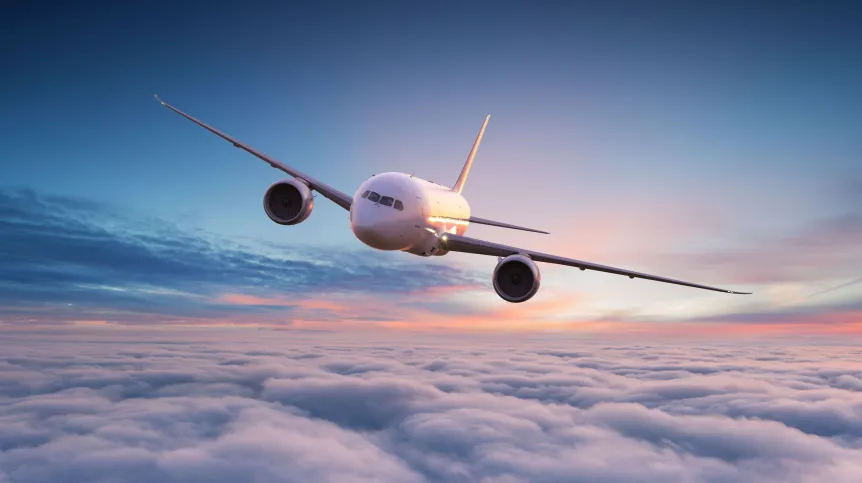
Thanks to the introduction of passenger compensation, average flight delays in the EU have been reduced by almost 5 minutes. This is only seemingly little - in the entire EU over a year, this means a time saving equal to about ten thousand years, according to analyses by a researcher from the Institute of Economics of the Polish Academy of Sciences.
The author of this analysis, Piotr Śpiewanowski, PhD, emphasises in an interview with PAP that his study has attracted a lot of interest, also from the US administration. 'It was mentioned by President Joe Biden as a key factor influencing the proposed regulations aimed at increasing the liability of airlines also in the US. The aim of these regulations is to better protect passengers from frustration related to flight delays and cancellations caused by airlines', he says.
The study, conducted by Śpiewanowski and Hinnerk Gnutzmann, PhD, from Leibniz University in Hannover (https://doi.org/10.1016/j.tranpol.2023.03.017), concerned the impact of regulations giving passengers of delayed flights the right to compensation. 'They enable people whose flights are delayed by more than three hours to seek compensation. They give them the right to food vouchers, and in some cases, reimbursement of accommodation costs or transport to and from the airport. What prompted us to address this topic was the fact that the aforementioned regulation does not apply to all flights within the European Union. The regulation does not cover flights to the European Union if their operator is an airline not registered in the EU. Thanks to this, we were able to make a comparison and check whether such regulations actually improve the quality of services in this industry', says Piotr Śpiewanowski from the Institute of Economic Sciences of the Polish Academy of Sciences.
The EC261 regulation was introduced in the EU in 2004. Initially, it mainly covered cancelled flights and situations in which passengers were not allowed to board due to overbooking. Over time, it was expanded to include cash compensation for people who reach their destination with a delay of more than three hours.
The amount of compensation depends on the length of the route and ranges from EUR 250 to EUR 600. Additionally, passengers are entitled to meals, drinks and accommodation in the event of a long wait for the next flight.
The comparative analysis conducted by the researchers showed that thanks to the EC261, the average departure delays were reduced by almost five minutes. 'Although this may seem like a small difference, it is of great importance on the scale of the entire aviation market in the European Union. After all, around a billion passengers use EU airports every year. Reducing delays by five minutes for each flight means time savings equal to around ten thousand years - in one year', the researcher emphasises.
He explains why the regulations under study are effective. 'Regulations force airlines to better organize various operations in order to avoid high costs related to compensation', he says. Carriers have begun to take care of issues such as reserve crews and renting additional aircraft in crisis situations.
And although the regulations have proven to be very beneficial for passengers, not everyone is in favour of them. Airlines argue that they generate additional costs that are ultimately passed on to customers in the form of higher ticket prices.
The researcher also mentions that the regulations are particularly helpful for people on long-haul flights with transfers. 'The EC261 regulation applies to delays along the entire flight route, not just at its individual stages. Therefore, if, for example, a passenger's flight is delayed by an hour, they may not make it to the next plane, and therefore they reach their destination many hours after the planned time, despite the fact that only one flight did not arrive on time and it was only an hour late', he reminds.
However, he adds, it should be emphasised that although the discussed regulations give passengers the right to compensation, they are not automatic. 'Each passenger must individually apply for compensation to the airline', he emphasises.
According to Śpiewanowski, his and Gnutzmann's study has become a key argument in the debate on the introduction of similar regulations in the United States. President Joe Biden's administration decided that EU law should become a model for the American aviation market. The legislative process is currently at the stage of public consultations, which will be completed in the coming months. (A film with Biden's statement on this subject is available here: https://www.youtube.com/live/Yz9UWd-ELd4?si=xYRJPvI2RhDz8XkD)
'It is extremely rare for the President of the United States to mention specific studies in his speeches. The fact that President Biden distinguished ours is a great honour that emphasises its importance and motivates us to continue our work', Śpiewanowski emphasises.
The results of the scientists' work, published in the journal Transport Policy (https://doi.org/10.1016/j.tranpol.2023.03.017), also met with great interest in foreign media. They were quoted, among others, by The New York Times (https://www.nytimes.com/2023/05/09/travel/airline-compensation-flight-delays-cancellations.html) and The Guardian (https://www.theguardian.com/australia-news/2025/jan/03/australian-airlines-more-delayed-than-foreign-competitors-but-government-decides-not-to-nudge-laws). Śpiewanowski also presented them during a speech in the European Parliament.
Katarzyna Czechowicz (PAP)
kap/ zan/













